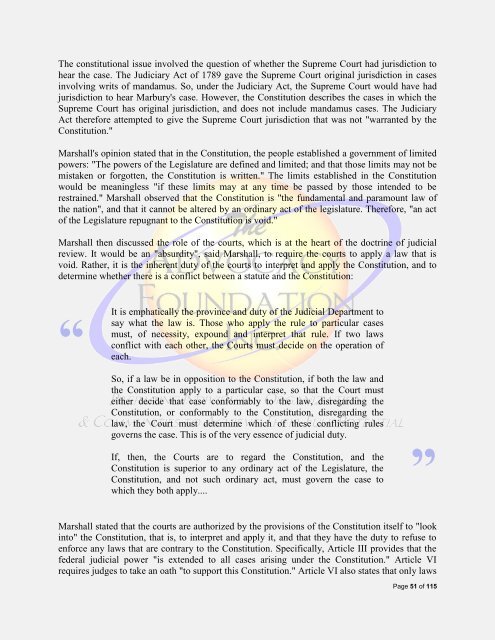Judicial ReEngineering
Judicial ReEngineering
Judicial ReEngineering
You also want an ePaper? Increase the reach of your titles
YUMPU automatically turns print PDFs into web optimized ePapers that Google loves.
The constitutional issue involved the question of whether the Supreme Court had jurisdiction to<br />
hear the case. The Judiciary Act of 1789 gave the Supreme Court original jurisdiction in cases<br />
involving writs of mandamus. So, under the Judiciary Act, the Supreme Court would have had<br />
jurisdiction to hear Marbury's case. However, the Constitution describes the cases in which the<br />
Supreme Court has original jurisdiction, and does not include mandamus cases. The Judiciary<br />
Act therefore attempted to give the Supreme Court jurisdiction that was not "warranted by the<br />
Constitution."<br />
Marshall's opinion stated that in the Constitution, the people established a government of limited<br />
powers: "The powers of the Legislature are defined and limited; and that those limits may not be<br />
mistaken or forgotten, the Constitution is written." The limits established in the Constitution<br />
would be meaningless "if these limits may at any time be passed by those intended to be<br />
restrained." Marshall observed that the Constitution is "the fundamental and paramount law of<br />
the nation", and that it cannot be altered by an ordinary act of the legislature. Therefore, "an act<br />
of the Legislature repugnant to the Constitution is void."<br />
Marshall then discussed the role of the courts, which is at the heart of the doctrine of judicial<br />
review. It would be an "absurdity", said Marshall, to require the courts to apply a law that is<br />
void. Rather, it is the inherent duty of the courts to interpret and apply the Constitution, and to<br />
determine whether there is a conflict between a statute and the Constitution:<br />
“<br />
It<br />
is emphatically the province and duty of the <strong>Judicial</strong> Department to<br />
say what the law is. Those who apply the rule to particular cases<br />
must, of necessity, expound and interpret that rule. If two laws<br />
conflict with each other, the Courts must decide on the operation of<br />
each.<br />
So, if a law be in opposition to the Constitution, if both the law and<br />
the Constitution apply to a particular case, so that the Court must<br />
either decide that case conformably to the law, disregarding the<br />
Constitution, or conformably to the Constitution, disregarding the<br />
law, the Court must determine which of these conflicting rules<br />
governs the case. This is of the very essence of judicial duty.<br />
If, then, the Courts are to regard the Constitution, and the<br />
Constitution is superior to any ordinary act of the Legislature, the<br />
Constitution, and not such ordinary act, must govern the case to<br />
which they both apply....<br />
”<br />
Marshall stated that the courts are authorized by the provisions of the Constitution itself to "look<br />
into" the Constitution, that is, to interpret and apply it, and that they have the duty to refuse to<br />
enforce any laws that are contrary to the Constitution. Specifically, Article III provides that the<br />
federal judicial power "is extended to all cases arising under the Constitution." Article VI<br />
requires judges to take an oath "to support this Constitution." Article VI also states that only laws<br />
Page 51 of 115

















